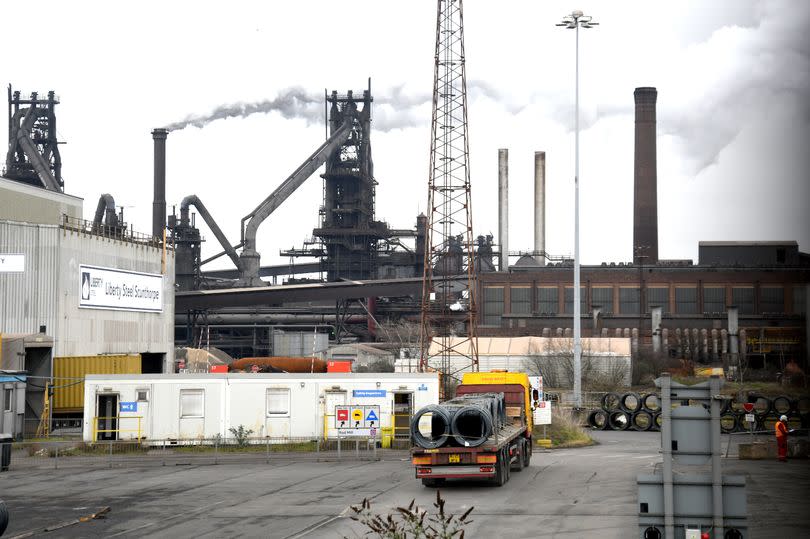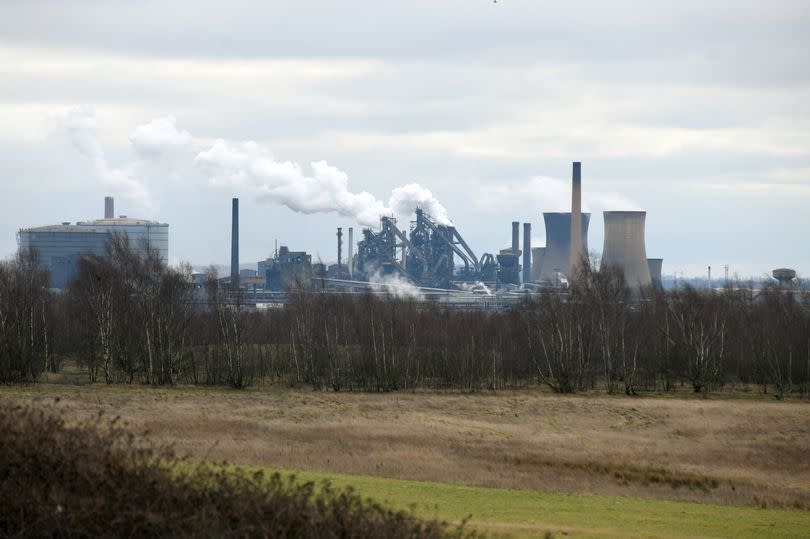Government support 'crucial' says British Steel as unions say closure of Scunthorpe blast furnaces 'would be devastating'

British Steel's president has said it is "crucial" now to secure government backing after its proposed Scunthorpe electric arc furnace (EAF) got planning approval.
A North Lincolnshire Council special planning meeting green-lit the proposal earlier this week. British Steel plans £1.25bn investment to become more sustainable, replacing its two Scunthorpe coke blast furnaces, with two EAFs, one in Teesside.
Unions have predicted more than 2,000 job losses at the Scunthorpe site, should the blast furnaces go, as planned. British Steel's chief commercial officer Alan Bell confirmed in the meeting the EAF's shorter steel process "will inevitably require fewer jobs", but a definitive number could not yet be given.
Read More:
British Steel's Scunthorpe electric arc furnace plan gets green light
How councillors reached decision on Scunthorpe steelworks electric arc furnace
The steelworks employs more than 3,200 people. The Scunthorpe EAF could be running by December 2025. A planning document shows British Steel intend to decommission the blast furnaces within 12 months of the EAF being operational.
British Steel's president and CEO Xijun Cao welcomed the Scunthorpe EAF planning approval, which follows permission granted for the Teesside EAF. "The proposed installation of EAFs in Scunthorpe and Teesside is central to our journey to a green future as they would help us reduce emissions of CO2 by more than 75 per cent. However, it is crucial we now secure the backing of the UK government.
"Our owner, Jingye, is committed to the unprecedented investment decarbonisation requires and our desire to dramatically reduce our carbon footprint, coupled with challenging market conditions, means it is imperative swift and decisive action is taken to ensure a sustainable future for British Steel.
"We are committed to working with the UK government and need to reach an agreement quickly so we can achieve our ambitious goals, secure thousands of jobs and keep making the steel Britain needs for generations to come." The government has so far offered £300m support.
The meeting heard British Steel had looked for two years at alternatives to be more sustainable. The company say the electrification will allow it to continue making the products its customers require.
British Steel has begun preliminary talks with trade unions about electrification, and promised to support employees affected by its decarbonisation plans. Unions say there was a lack of meaningful consultation before the EAF application. GMB's Charlotte Brumpton-Childs, speaking on behalf of all three unions, described it in the meeting as "putting the cart before the horse".
Want to sign up to the Scunthorpe newsletter, but can’t access the link below? Click here .
Alun Davies, Community's national officer for steel, said: "We oppose the loss of the blast furnace steelmaking at Scunthorpe, which would be devastating for our members at the works and a wider community which has been built on steel." The finer decarbonisation plan details should have been consulted on with unions before now, he said, adding: "But this is far from a done deal, and we do not and will not accept electric arc furnace (EAF)-only steelmaking across the British Steel sites."
The demise of Scunthorpe and Port Talbot blast furnaces would mean the UK loses its ability to make virgin steel, leaving the nation "totally reliant on dirty steel imports from heavy-polluting countries," Mr Davies said. "The company have now agreed to share details of their plan with our industry experts Syndex, and we look forward to working on a credible alternative to a short-sighted EAF-only future for steelmaking at Scunthorpe."
Scunthorpe's Conservative MP, Holly Mumby-Croft, said: "Since I was first elected as Member of Parliament for Scunthorpe, I have remained steadfast in my belief that we should support our steelworks, and our people who work there, by any means necessary." She believes the UK must have the ability to make virgin steel, currently only possible with blast furnaces.
"There is a place for electric arc furnace production in Scunthorpe, and I will always support measures that will protect jobs into the future." Allowing the EAF, on land separate to where the blast furnaces, would help achieve this and British Steel to produce green steel. The Scunthorpe MP added: "However, my view is clear: any electric arc furnace that is built in Scunthorpe should complement – not replace – the blast furnaces we currently have."

Ms Mumby-Croft said British Steel could make business decisions as it saw fit as a private company, "but if they want government support, then that support must come with protections on jobs". She called for guarantees the blast furnaces will run, at least as an interim, while cheaper, greener ways to run them are explored, as other countries are doing.
"As the negotiations between British Steel and the government continue, this will remain my absolute focus. I am proud of the steps the government has taken to protect steel jobs here in Scunthorpe, from paying workers’ wages in the handover, helping with high energy costs and repeatedly implementing trade safeguards and I will work hard to ensure that support continues."
Labour's parliamentary candidate for Scunthorpe County, Sir Nic Dakin, shared concerns expressed by British Steel, trade unions and councillors at the meeting. He said: "British Steel were clear that they would involve the trade unions fully in plans for the site's future once the application for the electric arc furnace was approved.
"This is an important part of decarbonising the industry but if we are to realise its full future potential we need a Labour government with its promise to invest £3bn to ensure we have a UK steel industry that retains our capacity to make virgin steel and protects our future defence and infrastructure security, minimising job losses."

 Yahoo News
Yahoo News 
